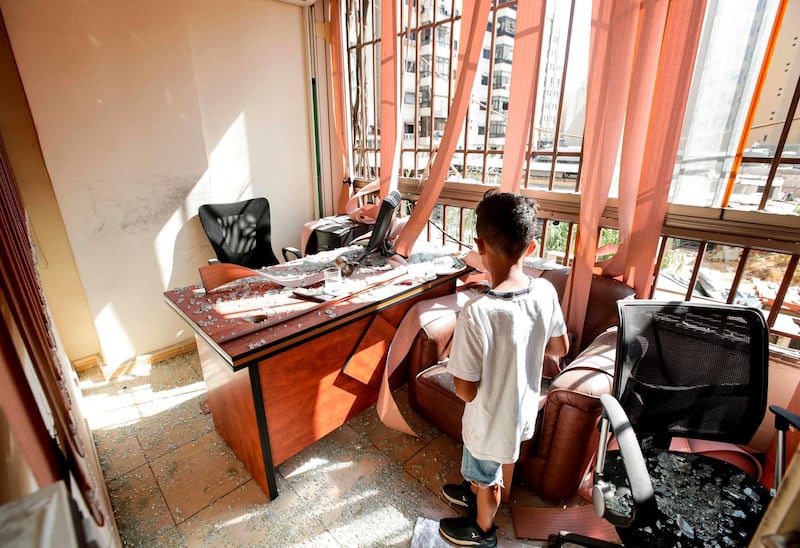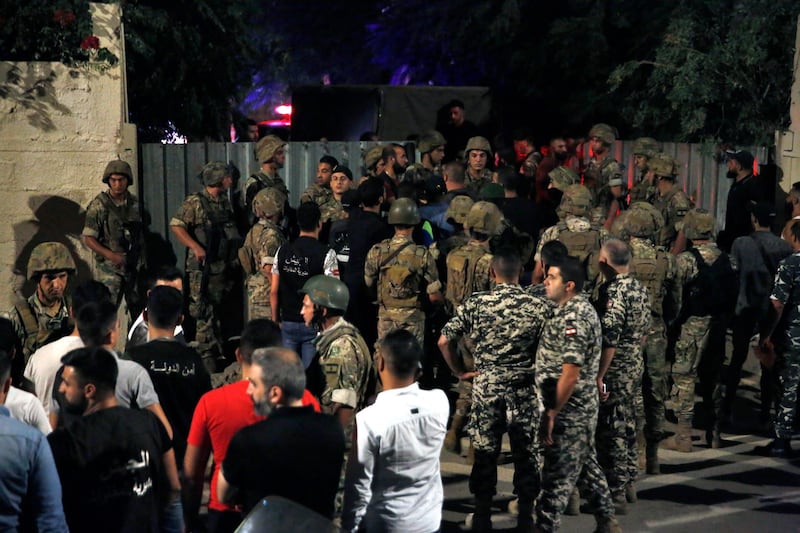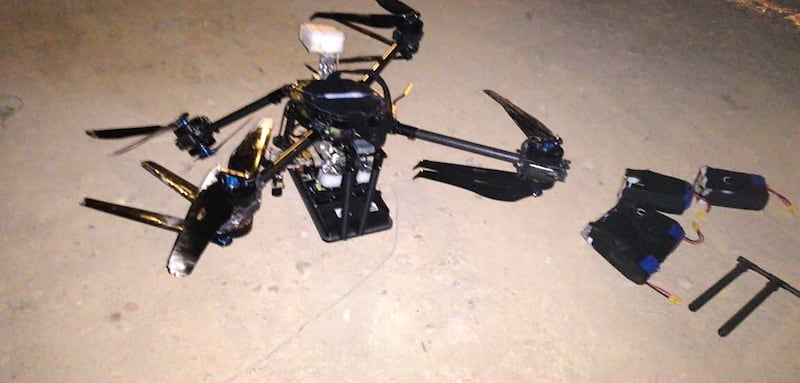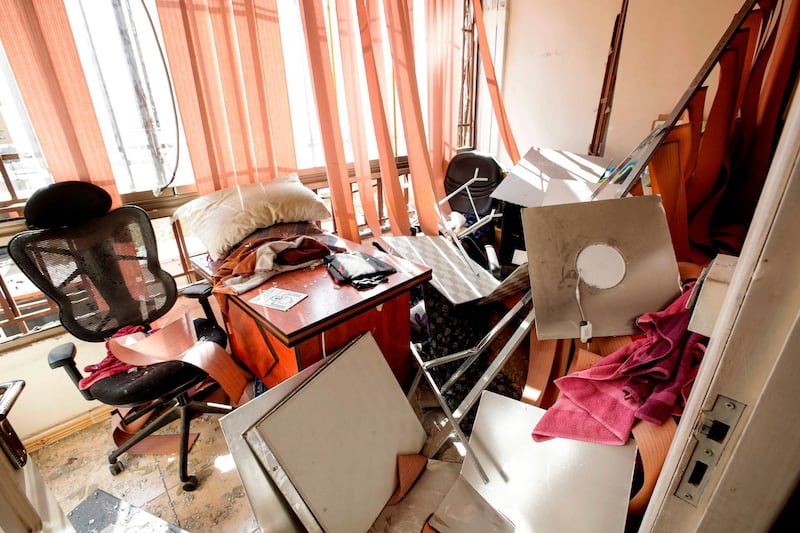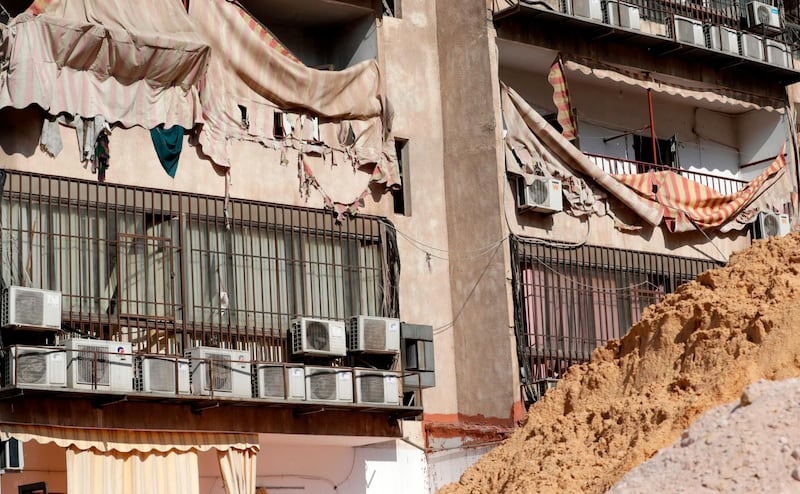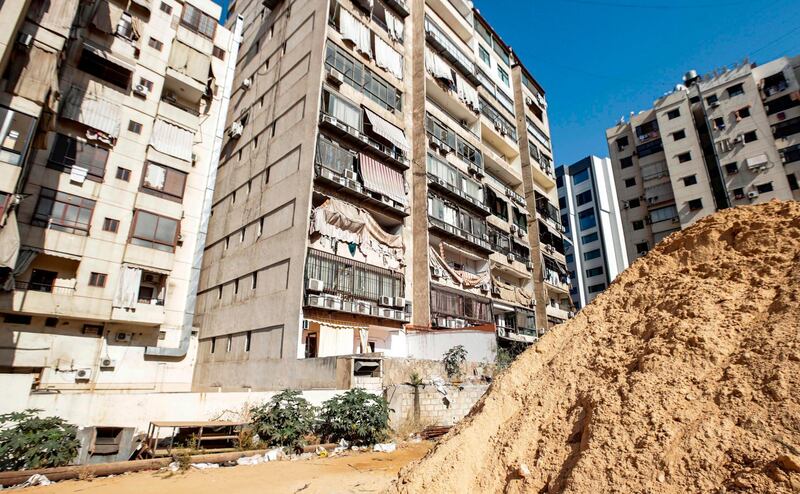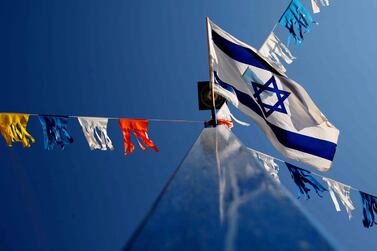Israeli reconnaissance flights over Beirut are a clear breach of Lebanese sovereignty and the UN resolution that ended the 2006 war, Prime Minister Saad Hariri said on Sunday, after two Israeli drones crashed in the capital.
One of the two drones that crashed in a south Beirut neighbourhood was “booby-trapped” and exploded after hitting a Hezbollah media office, the group's spokesman, Mohammed Afif, told the state-run National News Agency on Sunday morning.
The second landed and did not explode, Mr Afif said.
Mr Hariri said that Israeli craft were flying low over Beirut, Sidon and South Lebanon all day.
He called on the international community to curb Israel's near-daily surveillance flights over the country, which he said posed a threat to regional stability.
Mr Hariri said friends of Lebanon had a responsibility to protect UN Security Council Resolution 1701 “from the dangers of Israeli violations and their repercussions”.
He said that the Lebanese government would “assume its full responsibility to ensure no hostile plan threatens security, stability and national sovereignty”.
Mr Hariri said he was in contact with President Michel Aoun and Parliamentary Speaker Nabih Berri to discuss next steps.
Mr Aoun said the incident was “further evidence of Israel’s aggressive intentions and its targeting of stability and peace in Lebanon and the region”.
الرئيس عون يدين الاعتداء الاسرائيلي على الضاحية الجنوبية: عدوان سافر على سيادة لبنان وسلامة اراضيه وفصل من فصول الانتهاكات المستمرة لقرار مجلس الامن ١٧٠١ ودليل اضافي على نوايا اسرائيل العدوانية واستهدافها للاستقرار والسلام في لبنان والمنطقة
— Lebanese Presidency (@LBpresidency) August 25, 2019
Lebanon and Israel are still technically at war, having never officially ended hostilities, but they have not clashed in decades.
Hassan Nasrallah, leader of Iran-backed militia Hezbollah in Lebanon, warned in Beirut on Sunday that "there won't be any spot in Israel that will be safe" if Israeli planes entered Lebanese airspace again.
"I tell people who live in the north and everyone in occupied Palestine, they can't live a single moment safely," Nasrallah said. "We won't allow anyone to violate our sovereignty."
He said any Israeli drones that flew over Lebanon would be shot down.
Nasrallah said one of the drones had been flying low among buildings and was clearly on a military "suicide mission", which he called "clear aggression".
Hezbollah and Israel last fought in the 34-day 2006 war that killed more than 1,000 Lebanese, mostly civilians, and 121 Israeli soldiers and 46 Israeli civilians.
Israeli bombardments destroyed much of the country's infrastructure and displaced tens of thousands of people.
A Hezbollah official said the party did not shoot down the two drones over their south Beirut stronghold.
Another told Reuters that the drones had certain targets but investigations had not confirmed them.
The military and Mr Hariri said the drones were Israeli, but Hezbollah did not say to whom they belonged.
“Hezbollah did not shoot down any aircraft," Mr Afif said.
He said that the explosion from the second drone had damaged one of the party’s media offices but did not know if the building had been a target.
The National News Agency said three journalists were slightly injured in the blast.
The Lebanese military confirmed the incident on Sunday. It said the army responded and cordoned off the area before removing the aircraft and launching an investigation.
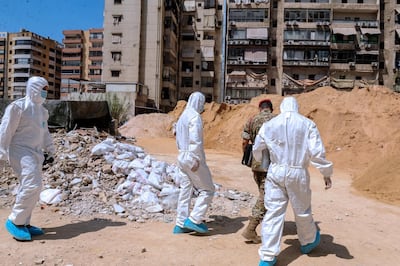
Sunday’s incident came hours after Israel launched air strikes in neighbouring Syria.
Lebanese security forces cordoned off the area around the Hezbollah media centre, as residents gathered. Forces from Hezbollah were also present on the scene.
Two ambulances and a firetruck where dispatched to #Beirut #Hezbollah stronghold of Southern suburbs where reports of an #Israel targeted assassination surging. Victim (or lack thereof) unknown so far. pic.twitter.com/hbFNIHrRoa
— Riam Dalati (@Dalatrm) August 25, 2019
Hezbollah was the only militia that did not disarm after the end of the Lebanese civil war in 1990.
The Iran-backed group has a major political influence with some parliamentarians and allies, as well as three seats in Cabinet.
Early in the Syrian war, Hezbollah sent thousands of fighters to bolster Bashar Al Assad at significant cost to the group’s supporters and its political standing.
Israel has launched hundreds of air strikes against Hezbollah and Iranian targets in Syria since the two intervened in the conflict.
Israel says it is preventing high-tech weapons transfers to Hezbollah and preventing the group from operating close to the occupied Golan Heights in southern Syria.
The Syrian Observatory of Human Rights, a war monitor in the UK, said two Hezbollah fighters and one Iranian were killed in Saturday's air strikes.
The Israeli air force "was able to thwart an Iranian attempt led by the Quds Force from Syria to conduct an attack on targets in northern Israel using killer drones".
The Quds Force is the overseas operations arm of Iran's Islamic Revolutionary Guard Corps.
The Israeli military says the head of the force, Qassem Soleimani, had commanded the attempted operation and flown operatives in through Damascus airport to carry out the attack.
Soleimani commanded an attack of killer drones on Israel. Iranian Quds operatives flew to the Damascus Intl. Airport with drones & explosives, and continued to an Iranian base in Syria to prepare for an attack on Israel.
— Israel Defense Forces (@IDF) August 25, 2019
An attack that never happened.
We attacked their base: pic.twitter.com/kXabH199r0
"The aggression was immediately confronted and so far the majority of the enemy Israeli missiles have been destroyed before reaching their targets," a Syrian military source told the official Sana news agency.
But a senior Revolutionary Guard commander denied that Iranian targets had been hit in the Israeli air strikes near Damascus, the semi-official Ilna news agency reported.
"This is a lie. Israel and the United States do not have the power to attack Iran's various centres and our military advisory centres have not been harmed," Maj Gen Mohsen Rezaei said.
Iran and Hezbollah have previously fired drones towards the Golan Heights.
The most serious incident came in February 2018 when Israel launched air strikes on Iranian targets in Syria after shooting down a drone near the line of control in the Golan Heights.
Syrian air defences appear to have hit an Israeli F-16I causing it to crash in Israeli-occupied Golan. It was the first time Israel has lost a jet to enemy fire since 1982.
